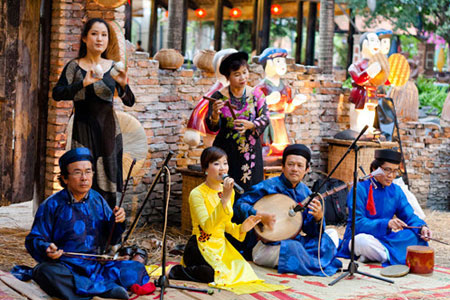(TITC) - Art of Don ca tai tu music and song in the South of Viet Nam (also known as Don ca tai tu) is a specific folk art type of Viet Nam, developed in the South region in the late nineteenth century. People in Southern Viet Nam consider Don ca tai tu as an indispensible spiritual cultural activity in festivals, death anniversary rituals and celebratory social events like weddings and birthdays... The death anniversary of the ancestors held annually on the twelfth day of the eighth lunar month.

Don ca tai tu has been influenced by some other forms of cultural heritage from the Central and South of Viet Nam such as ceremonial music (nhac le), classical theatre and folk song (hat boi). The repertoire of Don ca tai tu is based on 20 principal songs (bai to) and 72 classical songs (bai nhac co).
Instruments for Don ca tai tu performance include the moon-shaped lute (kim), two-stringed fiddle (co), 16-string zither (tranh), pear-shaped lute (ty ba), percussion (song lang), monochord (bau) and bamboo flute (sao). The violin and guitar are adapted. Don ca tai tu is performed within hereditary musical families and by music ensembles and clubs. The audience can join practicing, making comments or creating new song texts.
Don ca tai tu practitioners include master instrumentalists (thay don), master lyricists (thay tuong), master singers (thay ca), instrumentalists (danh cam) and singers (danh ca).
According to the inventory implemented in 2011, Don ca tai tu is practiced in more than 2,500 clubs, groups and families in 21 provinces and cities in the South of Viet Nam
On 5 December 2013, at the 8th session of the Intergovernmental Committee for the Safeguarding of the Intangible Cultural Heritage held in Baku City (Azerbaijan), UNESCO recognized officially Don ca tai tu as Intangible Cultural Heritage of Humanity.
Thu Giang